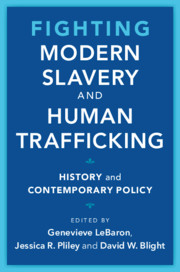Book contents
- Fighting Modern Slavery and Human Trafficking
- Slaveries since Emancipation
- Fighting Modern Slavery and Human Trafficking
- Copyright page
- Contents
- Figures
- Tables
- Contributors
- Preface
- Acknowledgments
- Abbreviations
- 1 Introduction
- 2 Counting Modern Slaves
- 3 Working Analogies
- 4 Free Soil, Free Produce, Free Communities
- 5 Ambivalent Abolitionist Legacies
- 6 Mexico’s New Slavery
- 7 Undermining Labor Power
- 8 A Market in Deception? Ethically Certifying Exploitative Supply Chains
- 9 Preventing Human Trafficking
- 10 Integrated and Indivisible
- Afterword If There Is No Struggle, There Is No Progress
- Index
1 - Introduction
Fighting Modern Slavery from Past to Present
Published online by Cambridge University Press: 18 June 2021
- Fighting Modern Slavery and Human Trafficking
- Slaveries since Emancipation
- Fighting Modern Slavery and Human Trafficking
- Copyright page
- Contents
- Figures
- Tables
- Contributors
- Preface
- Acknowledgments
- Abbreviations
- 1 Introduction
- 2 Counting Modern Slaves
- 3 Working Analogies
- 4 Free Soil, Free Produce, Free Communities
- 5 Ambivalent Abolitionist Legacies
- 6 Mexico’s New Slavery
- 7 Undermining Labor Power
- 8 A Market in Deception? Ethically Certifying Exploitative Supply Chains
- 9 Preventing Human Trafficking
- 10 Integrated and Indivisible
- Afterword If There Is No Struggle, There Is No Progress
- Index
Summary
Over the last two decades, fighting modern slavery and human trafficking have become a cause célèbre. Yet, large numbers of researchers, nongovernmental organizations, trade unions, workers, and others who would seem like natural allies of the fight against modern slavery and trafficking are hugely skeptical of these movements. They object to anti-slavery and anti-trafficking framings of the problems, and are skeptical of the "new abolitionist" movement. Why? In this Introduction, we explain how our edited book tackles key controversies surrounding the anti-slavery and anti-trafficking movements and scholarship head-on. We have assembled champions and sceptics of anti-slavery to explore the fissures and fault-lines that surround efforts to fight modern slavery and human trafficking today. These include: whether efforts to fight modern slavery displace or crowd out support for labor and migrant rights; whether and to what extent efforts to fight modern slavery mask, naturalize, and distract from racial, gendered, and economic inequality; and whether contemporary anti-slavery and anti-trafficking crusaders’ use of history are accurate and appropriate.
Keywords
- Type
- Chapter
- Information
- Fighting Modern Slavery and Human TraffickingHistory and Contemporary Policy, pp. 1 - 33Publisher: Cambridge University PressPrint publication year: 2021
- 1
- Cited by



